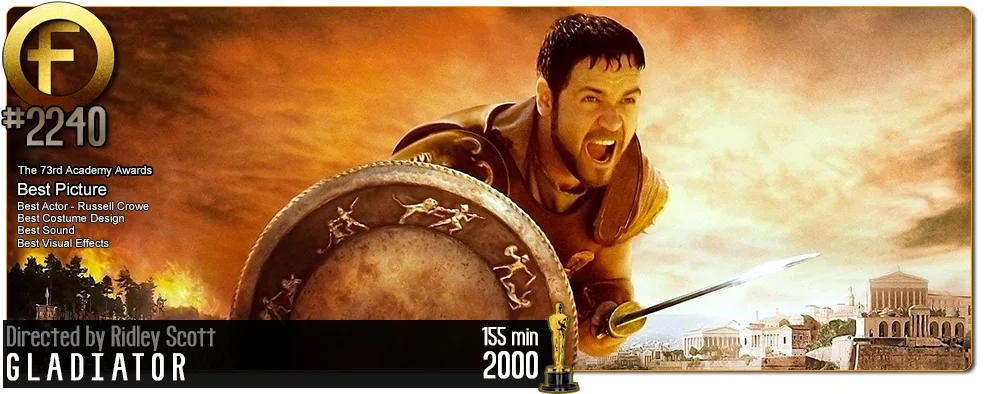Movie Review – Gladiator (2000)
Principal Cast : Russell Crowe, Joaquin Phoenix, Djimon Hounsou, Connie Nielsen, Oliver Reed, Derek Jacobi, Richard Harris, Ralf Moller, Tommy Flanagan, David Schofield, John Shrapnel, Tomas Arana, Spencer Treat Clark, David Hemmings, Sven-Ole Thorsen, Omid Djalili.
Synopsis: A former Roman General sets out to exact vengeance against the corrupt emperor who murdered his family and sent him into slavery.
********
In the pantheon of epic historical films, Gladiator stands as a towering colossus. Released in the year 2000, Ridley Scott’s magnum opus remains a masterclass in filmmaking, storytelling, and the power of cinematic spectacle. While many movies aspire to greatness, Gladiator achieved it with a ferocity that echoes through the annals of film history. It was made at a time when the “sword and sandal” epic was effectively extinct – films like Ben Hur, The Ten Commandments, and Spartacus had come, been seen, and gone – and paved the way not just for a resurgence of the genre, but of top-shelf blockbuster filmmaking packing audiences into the multiplex again. Gladiator also saw the breakout turn of Aussie-trained actor Russell Crowe, who would win the Oscar for Best Actor alongside a handful of screen titans supporting him. Arguably Ridley Scott’s best film (some might claim Alien, others might suggest The Martian), Gladiator has stood the test of time and remains an enduring classic not just of the genre in which it sits, but in moviemaking in general.

The film revolves around Maximus (Crowe), a loyal and virtuous commander of the Roman Army, who becomes ensnared in a web of treachery. After the dying Emperor Marcus Aurelius (Richard Harris), reveals his intention to grant Maximus power and transition Rome into a republic, he is murdered by his power-hungry son, Commodus (Joaquin Phoenix). This event precipitates Maximus’ fall from grace, as he is betrayed and left for dead. He is saved from death by the imperious and ferocious gladiator trainer Proximo (Oliver Reed), who teaches Maximus how to fight in the arenas of Rome, before his is taken to the Circus Maximus to become part of historical spectacle, brawling and killing to keep the dream of revenge alive.
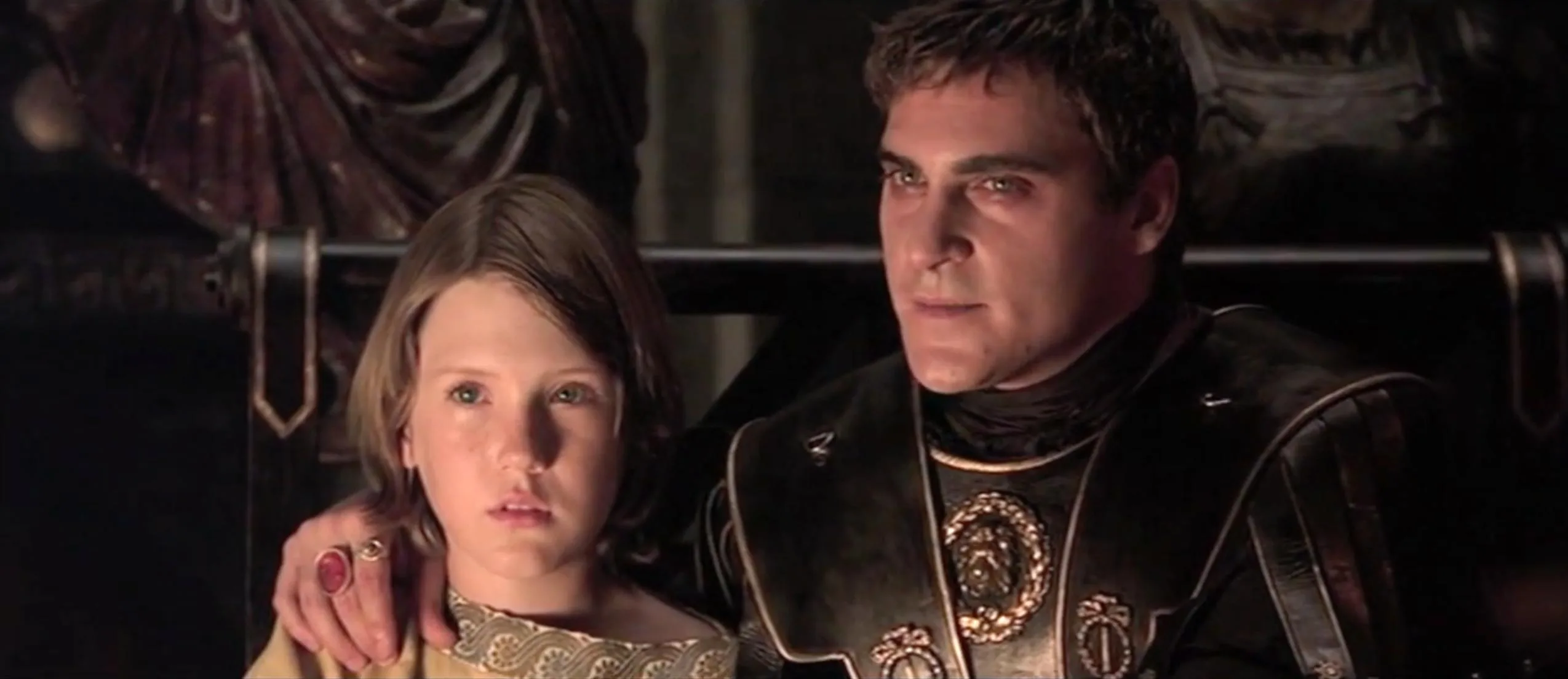
The road to bringing Gladiator to life was as tumultuous as the battles depicted within the film. The production faced several challenges, including the untimely death of Oliver Reed, who played Proximo, a gladiatorial trainer and key supporting character. Reed’s passing forced the filmmakers to rely on creative solutions, combining unused footage, body doubles, and CGI to complete his character’s arc. Moreover, the film’s budget skyrocketed, largely due to extensive reshoots and post-production efforts. Ridley Scott and his team went through Herculean efforts to ensure the historical accuracy of the film’s sets, costumes, and details, leading to both time and cost overruns. However, these struggles ultimately contributed to the film’s authentic and awe-inspiring visual grandeur.
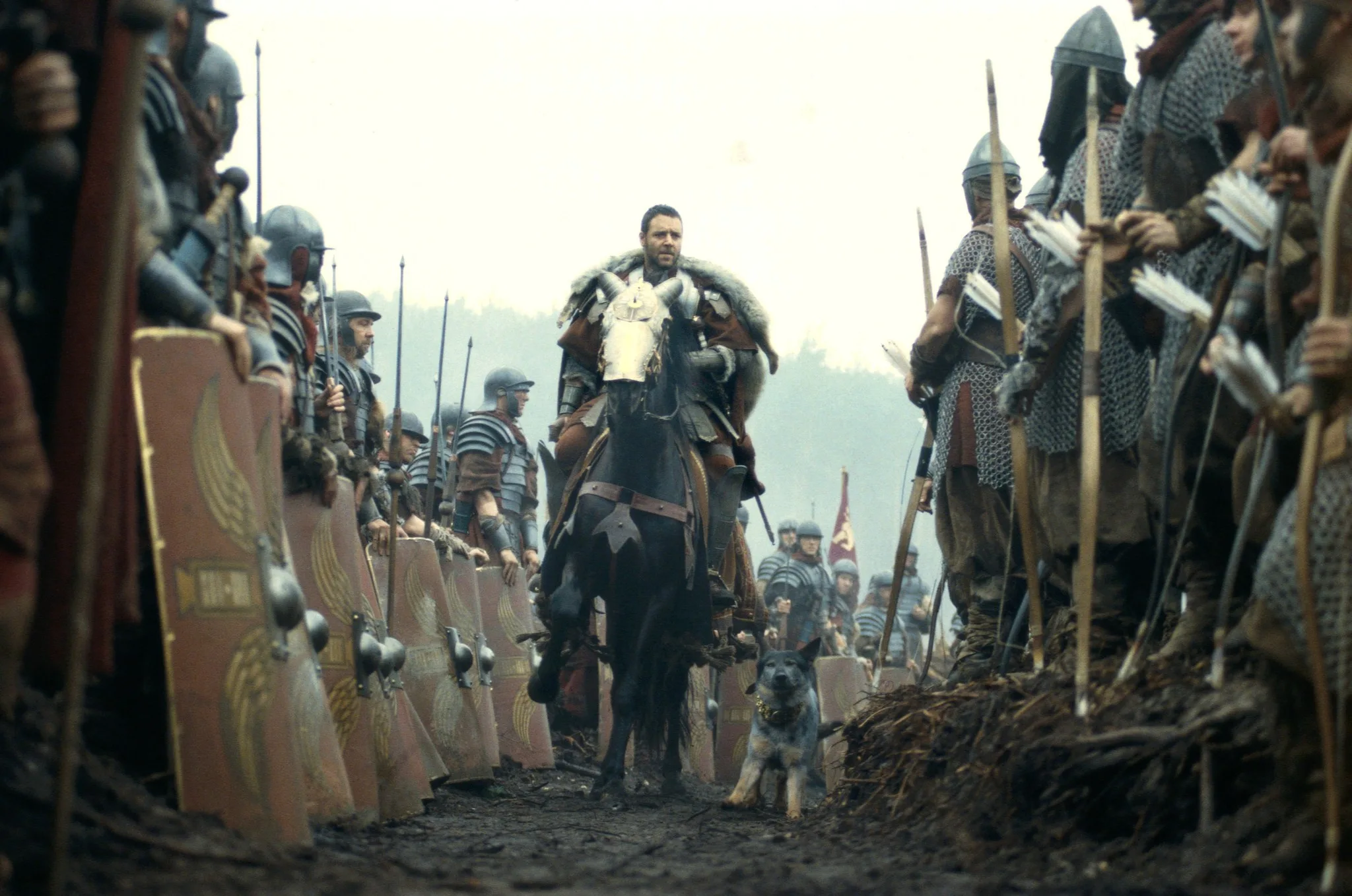
Ridley Scott’s direction in Gladiator is a masterclass in visual storytelling. His experience in crafting science fiction and horror films, such as Alien and Blade Runner, uniquely prepared him for the grandeur of this historical epic. Scott’s unrelenting attention to detail and uncompromising vision are evident in every frame. The film’s action sequences are a testament to Scott’s brilliance. The opening battle scene in Germania, where Maximus leads his troops to victory, is a staggering display of choreography and cinematography. The visceral intensity and chaos of battle are captured with such realism that the audience feels the mud and blood splatter. Scott’s use of wide shots to capture the grandeur of Rome, juxtaposed with close-ups that reveal the characters’ raw emotions, adds depth to the narrative. This technique is most evident in the Colosseum scenes, where the contrast between the awe-inspiring arena and the characters’ inner turmoil creates a sense of impending doom. It’s as if the gladiators cannot escape their fate, even if they win, and it palpates the heart to a frenzy.
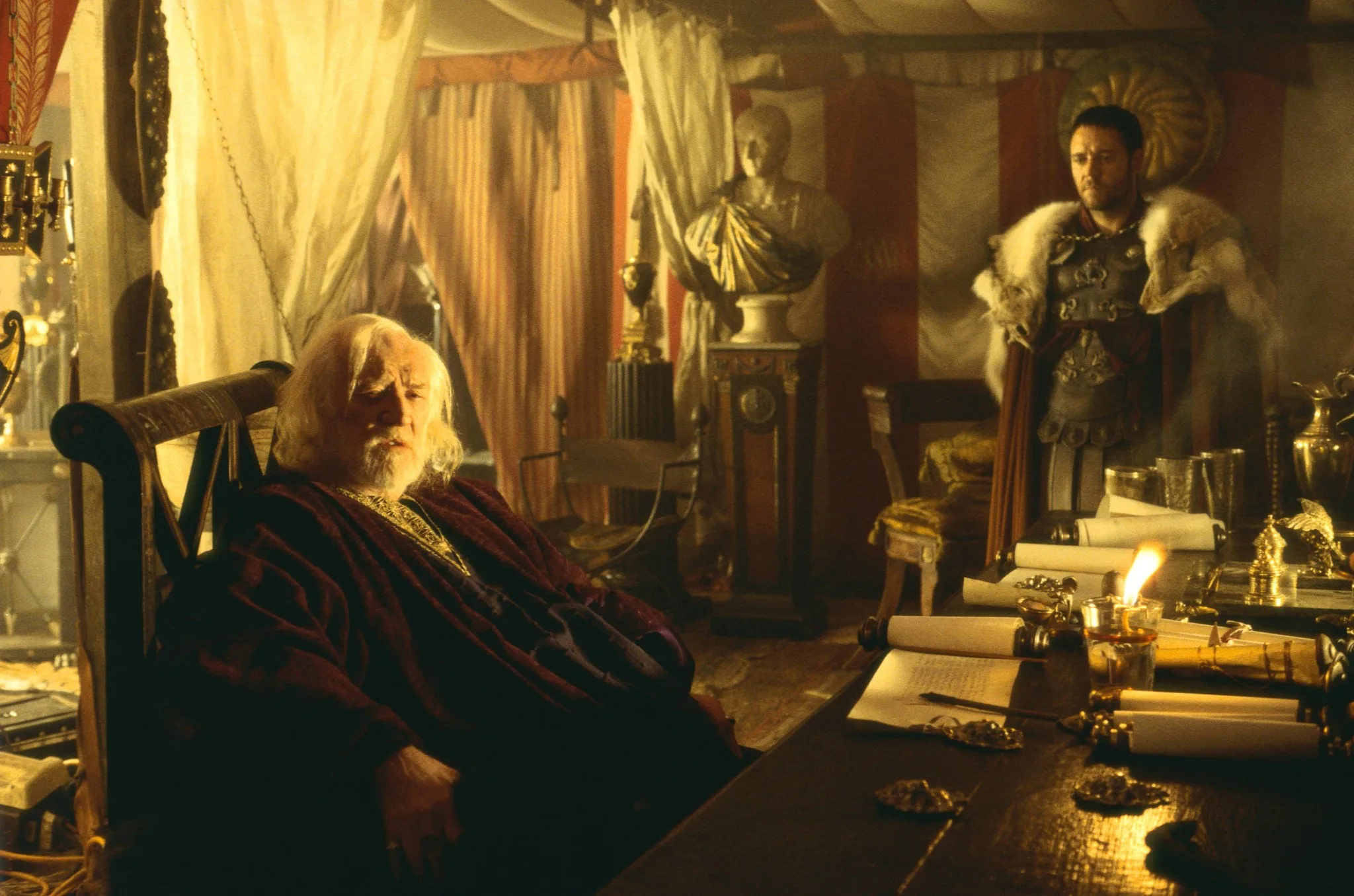
David Franzoni, John Logan, and William Nicholson deserve praise for their meticulous screenwriting. They crafted a story that, while rooted in historical accuracy, manages to be emotionally resonant. Gladiator‘s dialogue is both poetic and impactful, delivering memorable lines that linger in the mind long after the credits roll. Maximus’s journey from hero to gladiator is marked by his unwavering determination to avenge his family and Emperor. His character is deeply human, and the writers use his inner conflict and dialogue to explore themes of duty, loyalty, and the cost of vengeance. Commodus, the film’s complex antagonist, is driven by jealousy and a relentless pursuit of power. His character arc and dialogue are crafted with depth, showcasing the psychology of a man consumed by his own insecurities.
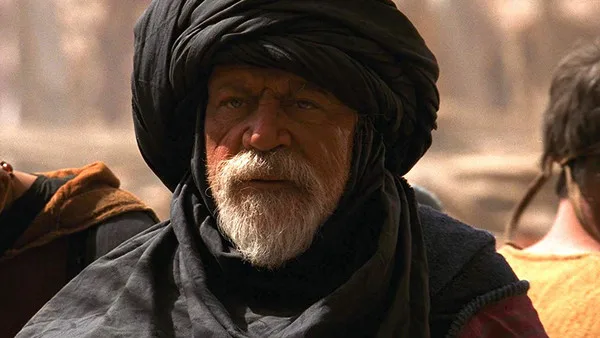
Gladiator delves into a myriad of timeless themes that resonate with audiences to this day. The film explores the corrupting influence of power, as Commodus’s lust for authority leads him down a path of cruelty and moral decay. His desire to be loved and respected, despite his malevolent actions, reflects a universal human desire for approval. The concept of loyalty, both to a leader and to one’s principles, is central to the film. Maximus’s unwavering loyalty to Marcus Aurelius and his family is juxtaposed with the treacherous betrayals that surround him. The contrast between his steadfast character and the morally bankrupt Roman elites provides a stark commentary on the nature of honour. Family is another recurring theme. Maximus’s quest for vengeance is driven by his love for his murdered wife and son, creating a relatable emotional anchor in the story. The audience can’t help but empathize with his thirst for retribution.
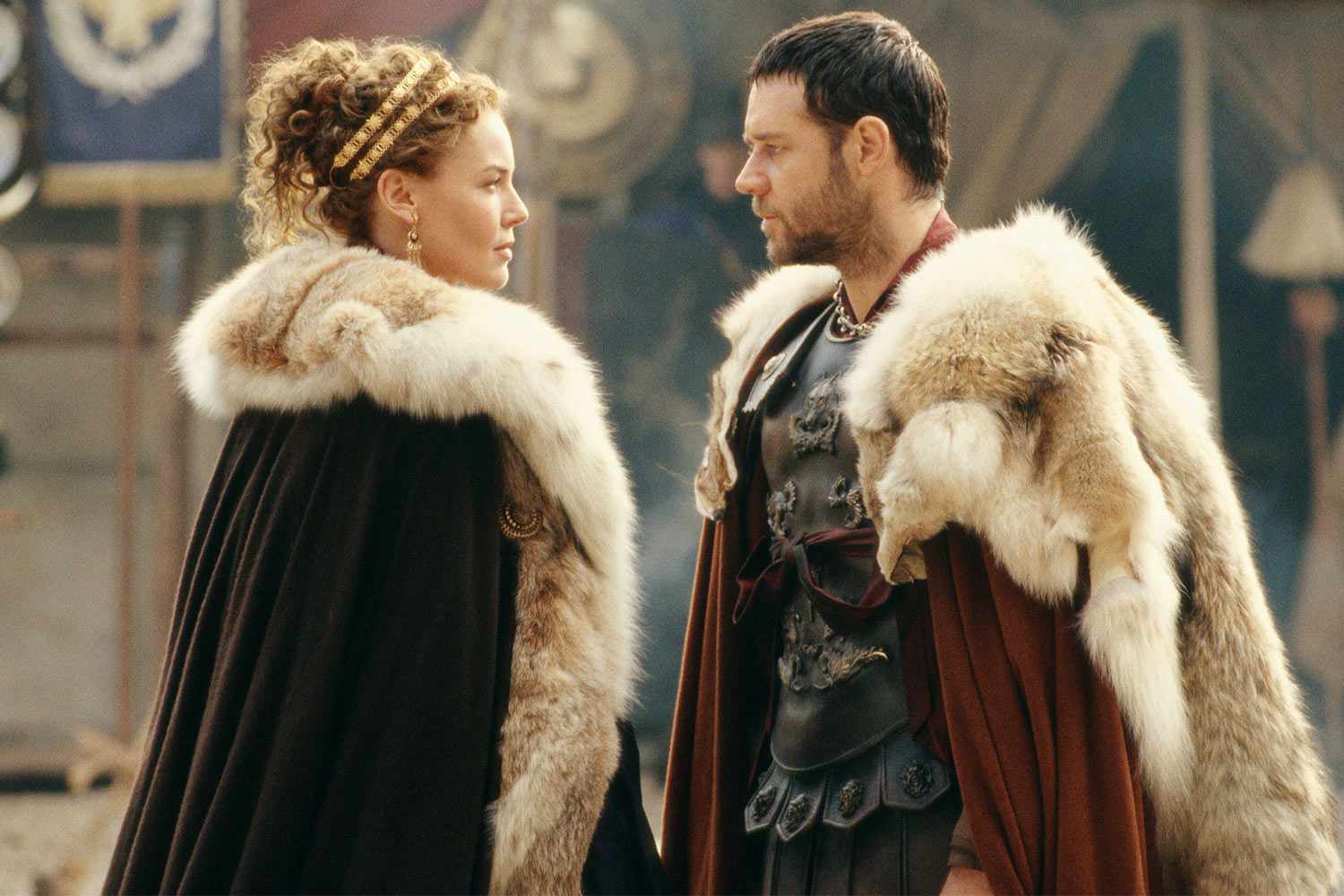
At the heart of Gladiator is the extraordinary performance of Russell Crowe as Maximus Decimus Meridius. Crowe’s portrayal is a tour de force. His commanding presence, nuanced expressions, and unwavering determination make Maximus an unforgettable character. Crowe’s Oscar-winning performance catapulted him to stardom, solidifying his place in Hollywood’s A-list. Joaquin Phoenix’s portrayal of Commodus is equally noteworthy. His depiction of the twisted, power-hungry emperor is nothing short of chilling. Phoenix embodies the character’s narcissism and cruelty with a subtlety that is both fascinating and repulsive. Connie Nielsen, who plays Lucilla, Commodus’s sister and Maximus’s former love interest, delivers a strong and dignified performance. Her character is the moral compass of the story, torn between her loyalty to her brother and her affection for Maximus. Djimon Hounsou as Juba, one of Maximus’s fellow gladiators, provides a soulful performance that adds depth to the story. His character’s unwavering loyalty to Maximus and their friendship create emotional resonance. Oliver Reed’s posthumous appearance as Proximo is a poignant tribute to the late actor. Reed’s commanding presence as the seasoned gladiator trainer enriches the film’s portrayal of the gladiatorial world – it’s a shame the actor never had the chance to view the finished film.
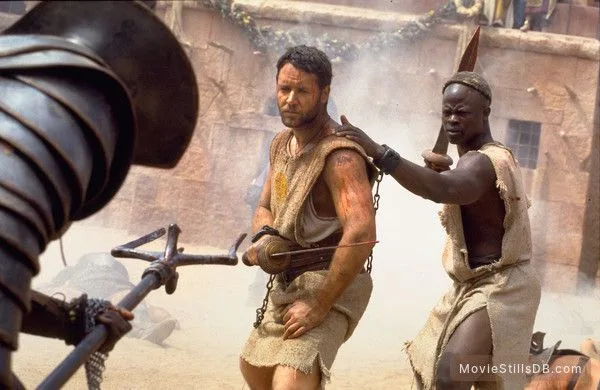
Beyond the main cast, Gladiator boasts a cast of supporting characters who play pivotal roles in the unfolding drama. Spencer Treat Clark plays young Lucius, the son of Lucilla, and his innocence and vulnerability serve as a poignant contrast to the morally corrupt world of Roman politics. Maximus’s interactions with Lucius reveal his compassionate and fatherly side, further endearing him to the audience. Derek Jacobi has a memorable minor role as Gracchus, a senator and close ally of Maximus. Gracchus represents the last vestiges of Roman integrity in the Senate. His machinations against Commodus are a testament to the film’s exploration of political intrigue and power struggles. David Hemmings plays a scheming senator, Falco, who is a foil to Gracchus. His character epitomizes the venality and ambition that plague the Roman political system. The tension between Gracchus and Falco contributes to the film’s political intrigue. “I know that face” actor John Shrapnel plays Senator Gaius, who openly supports Commodus. His character exemplifies the moral bankruptcy of the Senate, as he actively endorses the new emperor’s reign of tyranny. Gaius serves as a symbol of the film’s broader commentary on political corruption. The supporting cast in this film as exemplary, in even the smallest parts.
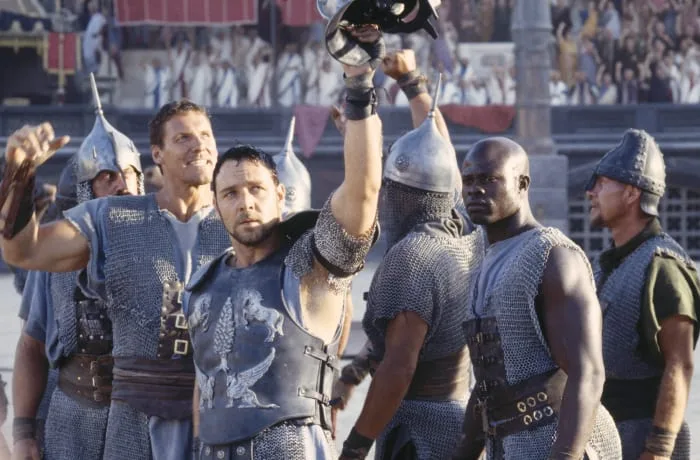
The musical score, composed by the legendary Hans Zimmer and featuring vocals by Lisa Gerrard, is an integral and evocative element of the film’s emotional landscape. Zimmer’s score is a symphonic triumph, with its powerful orchestration, haunting vocals, and memorable themes. The main theme, known as “Now We Are Free,” is instantly recognisable and has become synonymous with the film itself. It weaves together a sense of heroism, tragedy, and the grandeur of ancient Rome. The score complements the film’s visual grandeur, enhancing its emotional depth and epic scale. Zimmer’s composition not only adds resonance to the characters and their journey but also contributes significantly to the film’s timeless and immersive quality, making it an indispensable component of the film’s cinematic magic.
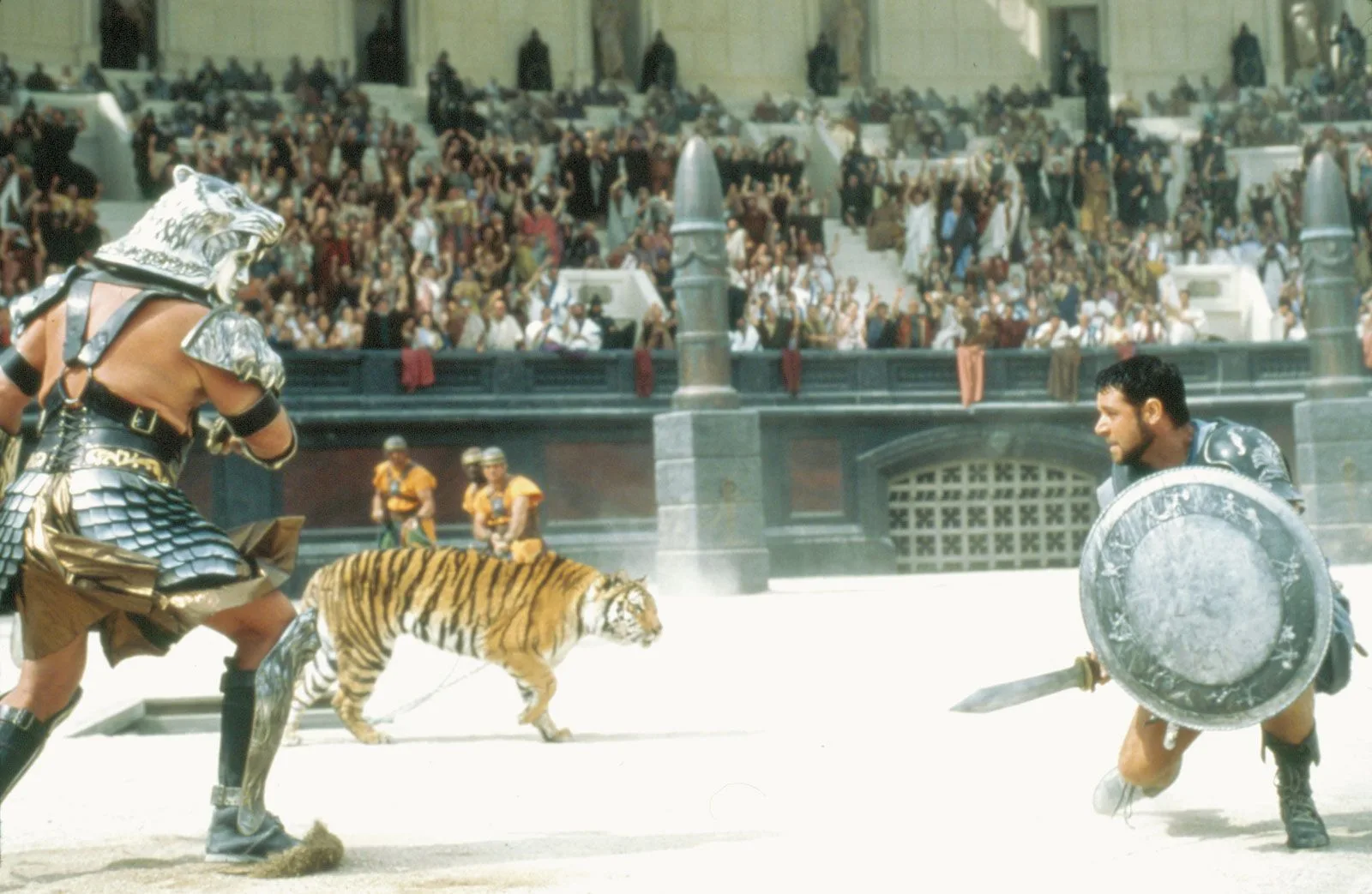
Gladiator made a seismic impact on both the film industry and popular culture. Its blend of historical drama, action, and character-driven storytelling appealed to a wide audience. The film’s visual splendour and immersive world-building transported viewers to ancient Rome, a testament to Ridley Scott’s directorial prowess. At the box office, Gladiator was a triumph, grossing over $457 million worldwide against a budget of approximately $103 million. Its financial success, combined with critical acclaim, solidified its place as a cinematic milestone. The film would snag 5 Oscars of the eleven it was nominated for – Best Picture, Actor, Costume Design, Sound and Visual Effects, and has since become a cultural mainstay with memorable dialogue such as Maximus’ “Father to a murdered son, husband to a murdered wife” monologue, as well as Crowe’s commanding central performance.
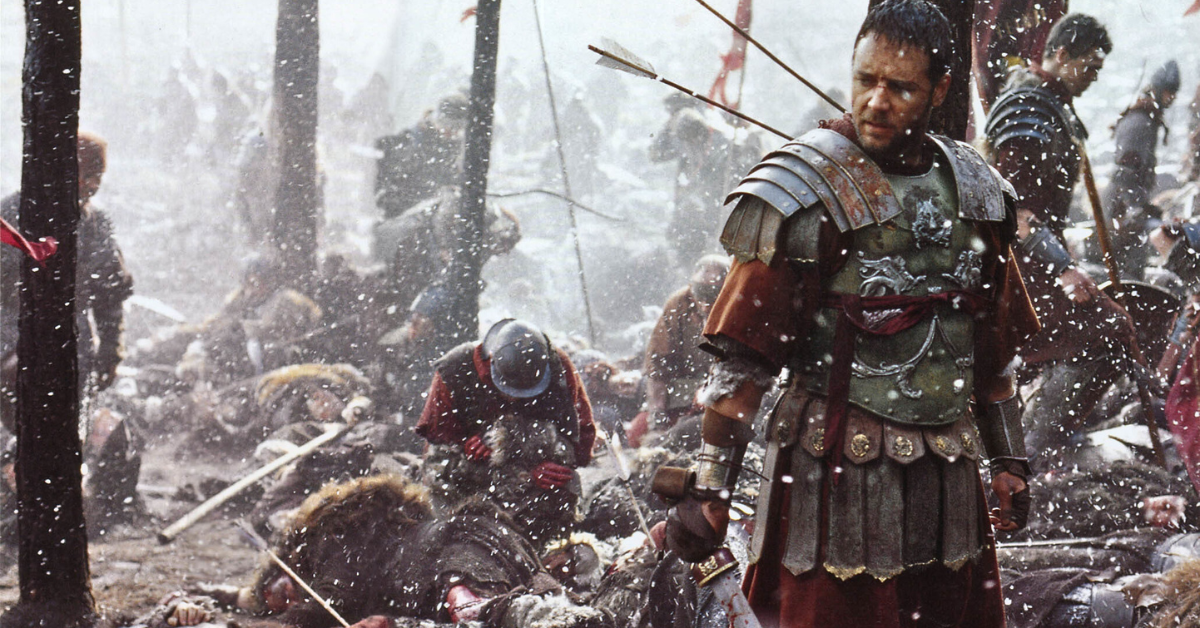
Russell Crowe’s meteoric rise to stardom can be attributed, in large part, to his role as Maximus in Gladiator. Prior to this film, Crowe was a respected actor but far from a household name, despite notable performances in films such as Romper Stomper, The Quick & The Dead, and LA Confidential, the latter of which saw Ridley Scott think of him for the role. Coincidentally, Crowe’s turn as Jeffrey Wigand in The Insider, a year prior, had given him his first Oscar nomination (he lost to LA Confidential co-star Kevin Spacey for American Beauty). His magnetic performance not only won him the Academy Award but also the hearts of audiences worldwide. Crowe’s portrayal of Maximus displayed a commanding presence, unwavering determination, and a quiet intensity that resonated with viewers. His rugged masculinity and emotional depth made him an instant cinematic icon. After Gladiator, Crowe’s career reached new heights – he would follow this film up with projects such as A Beautiful Mind, Master & Commander, and the less-successful Cinderella Man and A Good Year, the latter of which re-teamed him with Ridley Scott.
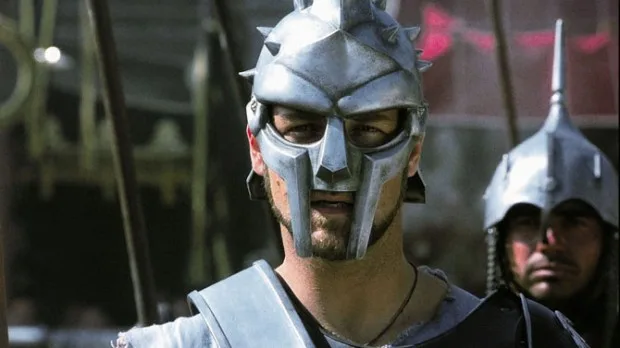
In the realm of epic cinema, Gladiator stands as a titan. Its troubled production, combined with Ridley Scott’s directorial brilliance and the powerful screenplay, resulted in a film that continues to captivate audiences. The exploration of timeless themes, impeccable performances, and cultural impact solidify its place in the annals of cinematic history. With a rich tapestry of characters, led by Russell Crowe’s iconic performance as Maximus, Gladiator delivers an unforgettable journey through ancient Rome. The film’s Academy Award success and its pivotal role in launching Crowe’s career further underscore its significance in the world of cinema. In the two decades since its release, Gladiator has not lost an ounce of its potency. It remains an enduring testament to the power of storytelling and the magic of the silver screen. Whether you’re a history enthusiast, a fan of pulse-pounding and visceral action sequences, or simply in search of an epic tale of heroism and redemption, Gladiator is a must-watch for all cinephiles. So, grab some popcorn, settle into your seat, and prepare to be transported to ancient Rome, where one man’s indomitable spirit lit the way for a cinematic masterpiece.
Note: This review is written by the author with additional material by ChatGPT

